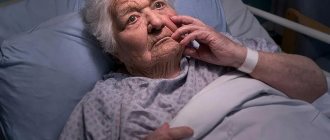What is depression?
When doctors talk about depression, they are talking about a condition called major depression. Patients with major depression experience the following symptoms all day long, almost every day for at least 2 weeks in a row.
If you have depression, you may also have headaches, pain in other parts of your body, or problems with digestion or sex life. An older person with depression may have difficulty understanding simple messages or requests made to them.
Symptoms of depression:
- lack of interest in activities that were previously enjoyable.
- Feeling sad or empty.
- Tearfulness, causeless crying.
- A feeling of inhibition or, conversely, a feeling of restlessness and the inability to sit in one place.
- Feelings of worthlessness or guilt.
- Rapid weight gain or loss.
- Thoughts about death or suicide.
- Difficulty thinking, remembering, or concentrating on current activities.
- Difficulty making everyday decisions.
- Trouble sleeping, especially in the early morning hours or feeling sleepy throughout the day.
- Constant feeling of fatigue.
- Feelings of emotional numbness, sometimes to the point of being completely unable to cry.
Complications, consequences
The central risk associated with the disease is suicidality. The statistics of successful and unsuccessful attempts to commit suicide due to depression is high. The disease can completely disable a person. Without therapy, the following consequences occur:
- symptoms increase and become more aggravated;
- psychotic manifestations develop;
- performance is lost;
- inability to learn;
- lack of social contacts and adaptation.
Without treatment, a person will experience severe migraines. This excruciating sensation of pain, as if something sharp had been stuck into the eyes. Characterized by intolerance to light and loud sounds. Depression implies an inflammatory process not only from a mental understanding, but also from a physical one. Due to somatic symptoms, people with depression have a higher risk of developing arthritis and psoriasis.
Mental disorder negatively affects overall health. Changes affect all organs, systems and tissues. The disorder itself does not provoke pathologies of internal organs. However, patients with mental illnesses in almost 90% of cases adhere to an unhealthy lifestyle.
After several years of illness, a person is no longer able to cope with his previous work. Self-care skills suffer. Many patients at an advanced stage of the disease are no longer able to get out of bed in the morning.
What causes depression?
In all likelihood, the development of depression is associated with a violation of chemical metabolism in the brain, which in turn causes a deterioration in the communication of brain cells with each other. There is also a genetic predisposition to the development of depression. Depression can be associated with certain events in your life, such as the death of a loved one, divorce or job loss. Taking certain types of medications, abusing alcohol or drugs, or having an underlying medical condition can also lead to depression. Depression is NOT a result of weakness of character, laziness or lack of willpower.
HELP YOURSELF
Getting out of depression is facilitated by a number of steps that need to be taken, taking into account the above. Their effectiveness has been proven by people suffering from different types of this disorder from their own experience.
1. Proper nutrition is very important - a healthy diet allows you to feel good physically and be in a good mood. It does not include everything that is called fast food: Big Macs, grilled chicken, French fries. hot dogs, etc. These instant foods can poison the body and introduce many toxic substances into it. Meat can also be considered dangerous in this sense.
Much healthier are fatty varieties of sea fish, nuts, hard cheese, fruits (especially bright ones), vegetables, and seaweed. Chocolate is a good option, but you need to be careful with it, since excess sweets negatively affect your figure, and extra pounds can, in turn, again provoke depression.
2. Another great way to get out of depression is to normalize your sleep. You shouldn’t use any handy “helpers” to quickly fall asleep and sleep fully until the morning, without waking up from every rustle (this means sleeping pills or alcohol, although folk remedies in the form of decoctions are quite suitable). You can do it this way:
- make it a habit to go to bed strictly at a certain time, and not when you want or as it turns out;
- The most natural sleep pattern for a person is to fall asleep before midnight, or even better, at 10 pm, and get up early. In this case, sleep has healing, restorative properties;
- before going to bed, it is inadvisable to watch the news, films with a negative connotation such as thrillers and horrors, as well as read something like that - this can provoke nightmares;
- dinner should be early and not too heavy;
- the bedroom needs to be ventilated, you can take a warm bath, drink a glass of warm milk with honey, ask a family member for a massage.
3. Physical activity is an excellent way out of depression. We live in an era of physical inactivity, we move little, we lose little energy. But not so long ago, our grandparents, not to mention our distant ancestors, did not have such a problem as depression, although their life was not easy. They worked more physically, traveled on foot, and did not have as many “smart” household appliances to make household chores easier.
Therefore, we need to set aside some time a day for physical activity, be it leisurely walks, running, working in the front garden or in the garden, doing fitness or using exercise equipment, or walking. You need to be in the fresh air more often - it improves metabolism and enriches the body with oxygen.
4. Positive thinking is very important to get out of depression. Color the depressive grayness with bright colors, think about good things, do good to people. Smile, look for the best in others. If someone nearby is completely negative and nothing can be done about it, just reduce communication with him to a minimum.
5. Do what you like. A favorite activity or hobby will charge you with positive energy, allow you to relax faster and better after a hard day at work, and distract you from worries and bad thoughts.
6. To get out of depression you need to pamper yourself and give positive emotions. For women, shopping plays the role of a depressant. And it doesn’t matter what kind of purchases they are, small or large, they will still please you. By the way, shopping is also good for men, but they will not like jewelry, outfits or shoes, but something related to their hobby: fishing gear, a gun for hunting, a tool.
Diversity also brings positive emotions. This could be a trip, going to a restaurant, cinema or theater, or a dolphinarium.
Lead a healthy lifestyle, get rid of bad habits and complexes, treat emerging somatic diseases in a timely manner, do not delve into yourself or whine, avoid stressful situations. You can have a pet - your favorite animals have a positive therapeutic effect on people.
And now about the main thing: in order to get out of depression on your own, you need to appreciate every moment of your life. It is given once and must be enjoyed so that nothing passes by. You should not dwell on failures or consider any problem global. Throw everything out of your head, love and appreciate your loved ones, communicate, enjoy every minute.
How can depression be diagnosed?
If you have symptoms of depression, be sure to tell your doctor about it, this is the only way you can get effective help. Don't think your doctor can tell you're depressed based on your appearance. The sooner you seek help, the faster you will get rid of depression.
If you tell your doctor how you are feeling, he or she may ask some clarifying questions about your symptoms, your health, and your family's medical history. Your doctor may also order some tests and perform a general examination.
Where to go for help
A pessimistic attitude does not mean chronic depression. Mood may decrease due to natural life problems related to family, work, friends, personal life and other failures. After unpleasant events, healthy people gradually return to normal. Apathy and despondency pass. If they remain for a long time, you need to sound the alarm. The most severe types of the disease are characterized by the following symptoms:
- The patient is unable to satisfy his basic needs: prepare food, wash, brush his teeth.
- He lies in bed for a long time.
- Refusal to eat, lack of appetite.
- Dejection, thoughts of suicide.
If one of these symptoms occurs, you should think about the need for hospital treatment, since the sick person poses a danger primarily to himself. In the hospital, the patient will be prescribed the necessary medications, will undergo psychotherapy and, most importantly, the doctor will constantly monitor him. The clinic provides all conditions for the amendment.
A not so significant disadvantage of being there is boredom and the feeling that time is passing too slowly. But, in advanced forms of the disorder, this is the only effective way to overcome the disease, since the patient in this case needs the continuous supervision of the treating doctor.
How is depression treated?
Depression is treated with medication or a special type of counseling called psychotherapy. Sometimes these methods are combined.
What about drug therapy?
Several types of medications can be used to treat depression. These drugs are called antidepressants, and they have proven themselves very well. These drugs correct the chemical imbalance in brain cells that leads to depression.
Antidepressants work differently for different people. Each of them also has its own side effects. Therefore, if one of the antidepressants is not suitable for you or is not effective enough, it is quite possible that another drug from this group will help you. Improvement may occur after 1 week of treatment with an antidepressant, but the full effect is usually achieved after 6 to 8 weeks of treatment. Side effects usually occur at the beginning of treatment, but usually go away after a few weeks.
How long should I take the medications?
The length of treatment depends on the type of depression you have. Your doctor will likely prescribe you a course of therapy lasting 4 to 6 months or more. The duration of treatment should be sufficient to reduce the risk of relapse of depression. Be sure to discuss all aspects of your drug treatment with your doctor.
Types and stages
According to ICD-10, depression is classified according to severity and by type and type of course.
Depending on the severity, the following types of depression can be distinguished:
- mild course;
- moderate;
- severe disorder with or without psychotic features.
In the first two forms, ability to work is maintained, although the quality of life decreases. In the severe form, all symptoms are expressed, the ability to work is impaired, and there is a tendency to suicide.
It is also worth determining what form it comes in:
- depressive episodes;
- recurrent or recurrent disorders;
- chronic depressive symptoms.
Approximately 35% of people have a chronic form of depression that lasts two or more years. Moreover, the level of depression fluctuates significantly during this period.
Based on their origin, there are different types of depressive disorders:
- endogenous, as a manifestation of manic-depressive psychosis;
- exogenous;
- somatogenic.
Separately, seasonal affective disorders are distinguished; they are associated with the time of year, starting and ending noticeably at the same time. Depression usually occurs from late autumn to early spring.
What is psychotherapy?
During a psychotherapy session, you discuss with your family doctor, psychotherapist or psychiatrist certain events that are happening in your life. The emphasis may be on your feelings, hopes or relationships. You can also focus on your behavior, how it affects you, and what you can change about it. A course of psychotherapy usually lasts from 8 to 20 sessions.
Will I have to go to the hospital?
Depression is usually treated without hospitalization. Inpatient treatment is required if you have comorbidities that may interfere with treatment or if you are at risk of suicide.
How long does depression last?
It depends on how soon you receive qualified help. Left untreated, depression can last for weeks, months, or even years. The main danger of untreated depression is suicide. Treatment can help relieve depression in 6 to 8 weeks or less.
Our specialists
Khorkin Sergey Anatolyevich - Psychologist, systemic family therapist. Directions: difficulties in relationships with the opposite sex, family relationships, depression, neuroses, difficulties in communicating with other people, psychosomatic disorders; experiences of loss, grief. The cost of an individual consultation (50 minutes) is 3800 rubles. Family consultation (50 - 80 minutes) - 5500 rub.
Korshunova Yulia Valerievna - Analytical psychologist, child psychologist, family therapist. Experience in personal therapy and professional supervision.
The cost of an individual consultation (50 minutes) is 3800 rubles. Family consultation (50 - 80 minutes) - 5500 rub.
Salnikova Irina Anatolyevna - Practicing child psychologist, candidate of psychological sciences, clinical psychologist, analytical psychologist, specialist in the field of child and adolescent psychocorrection, expert diagnostician, author of training programs for psychologists and children's group programs. The cost of an individual consultation (50 minutes) is 3800 rubles. Family consultation (50 - 80 minutes) - 5500 rub.
Anna Nikolaevna Sarycheva - Family, child psychologist, narrative practitioner, doula, perinatal psychologist. The cost of an individual consultation (50 minutes) is 3800 rubles. Family consultation (50 - 80 minutes) - 5500 rub.
Sedlov Anton Yurievich - Analytical psychologist, child psychologist. The cost of an individual consultation (50 minutes) is 3800 rubles. Family consultation (50 - 80 minutes) - 5500 rub.
Overcoming depression:
- Limit yourself. Don't expect to complete everything you were able to do before. Make a realistic work plan.
- Don't give too much importance to all your negative thoughts, such as self-blame or expecting failure. Such thoughts are part of depression. They will disappear as soon as you get rid of depression.
- Participate in activities that give you pleasure or give you a feeling of achieving a goal.
- Avoid making important decisions while depressed. If you need to make this decision, ask someone you trust to help you.
- Avoid drinking alcoholic beverages and drugs. Both make depression worse, and both can interact dangerously with the antidepressants you are taking.
- Physical activity appears to cause chemical reactions in the body that improve your mood. Exercising 4 to 6 times a week for at least 30 minutes is an excellent achievement. However, even less activity can be beneficial.
- Try not to be disappointed. It takes some time for you to be completely free from depression.










